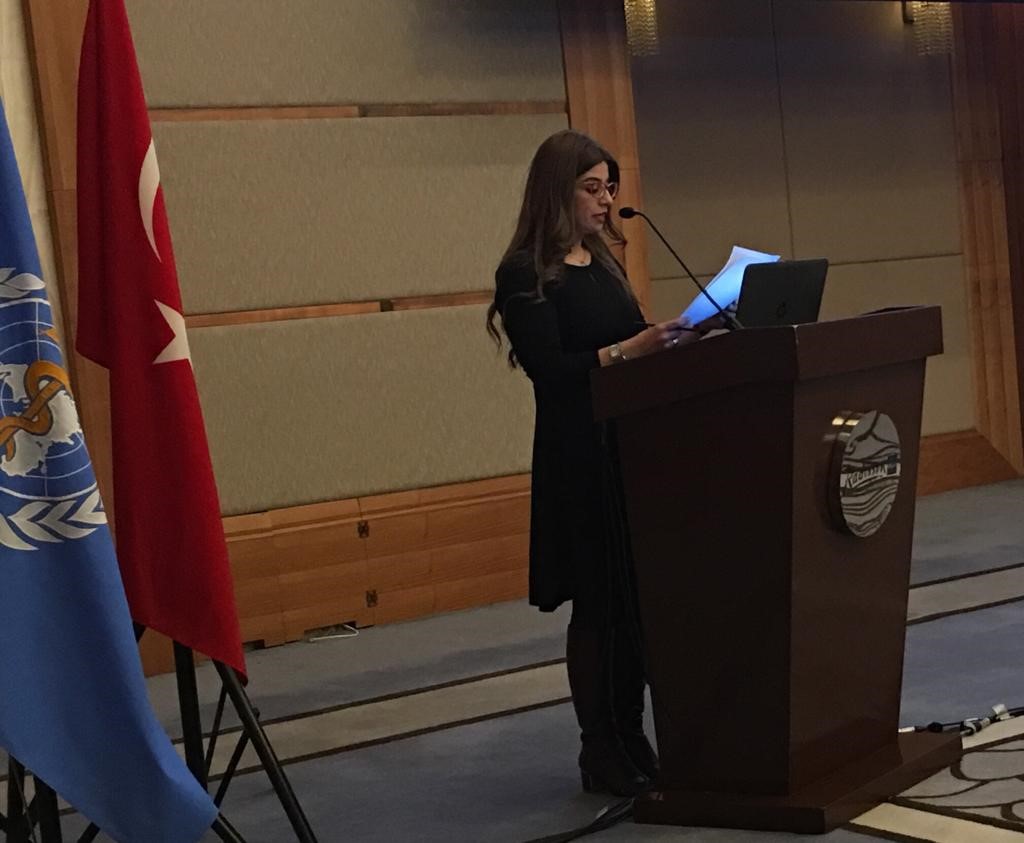 Over 60 participants attended the workshop
Over 60 participants attended the workshop
18 April 2019 – On 25–27 March, representatives of Member States, WHO, partner organizations, civil society and academia began a consultative process to develop a regional strategy and action plan to promote the health of migrants, refugees and displaced populations in the Eastern Mediterranean Region.
The proposed action plan for 2019–2023 aims to regionalize global commitments to improve migrant and refugee health made in the "Global Compact for Refugees", "Global Compact for Safe, Orderly and Regular Migration" and the "WHO Global Action Plan to Promote the Health of Refugees and Migrants". The 3-day interactive meeting provided a platform for participants to discuss global, regional and national issues, as well as to share evidence and good practices from countries in the Eastern Mediterranean Region, other WHO regions, in particular WHO's European and African regions.
The Eastern Mediterranean Region has witnessed an unprecedented magnitude and scale of crises over the last few decades. It now hosts the highest number of refugees worldwide. Currently, 66% of refugees, and 33% of asylum seekers reside in this Region, and currently one out of 10 people are displaced.
In addition to humanitarian emergencies, the Region is characterized by significant international and intra-regional migration, with the vast majority migrant workers. The Arab region itself hosts roughly 14% of the global migrant population and north Africa is home to 2.2 million migrants.
 Thus, many countries in the Region face considerable challenges in re-orienting national health and development plans toward the achievement of the Sustainable Development Goal targets, inclusive of refugees and migrants.
Thus, many countries in the Region face considerable challenges in re-orienting national health and development plans toward the achievement of the Sustainable Development Goal targets, inclusive of refugees and migrants.
The WHO Regional Office provides support to Member States to strengthen governance, leadership and ownership in the area of health of migrants, and refugees and to develop relevant technical materials, strategic research, development of assessment tools, model of care and applies the principle of delivering as one.
WHO continues to provide technical support to countriesto assess the public health capacity to prepared and respond to large influx of migrants, refugees and other vulnerable people on the move; to streamline human mobility within population-based health strategies, health information system, early warning system; to strengthen the capacity of Member States to identify health needs and health profile of migrants, refugees, displaced and other vulnerable mobile populations and host population alike.
Participants reviewed the proposed regional strategy and action plan and it will be further reviewed before submission to the Regional Committee for the Eastern Mediterranean of 2019 for proposed endorsement by Member States.
 Dalia Samhouri, Manager, Country Health Preparedness and International Health Regulations Programme Dr Dalia Samhouri, said that “countries in our region have shown excellent approaches and good practices that we can build upon. Nevertheless; we need to increase our endeavours as the challenges have not been fully addressed. The workshop provided us a notable platform to discuss our regional efforts and how we will join our forces. The recommendations, solutions and feedback of the participants were critical to ensure the most effective strategies and actions on the way to ‘Health for all by all’ goal for our region.”
Dalia Samhouri, Manager, Country Health Preparedness and International Health Regulations Programme Dr Dalia Samhouri, said that “countries in our region have shown excellent approaches and good practices that we can build upon. Nevertheless; we need to increase our endeavours as the challenges have not been fully addressed. The workshop provided us a notable platform to discuss our regional efforts and how we will join our forces. The recommendations, solutions and feedback of the participants were critical to ensure the most effective strategies and actions on the way to ‘Health for all by all’ goal for our region.”


